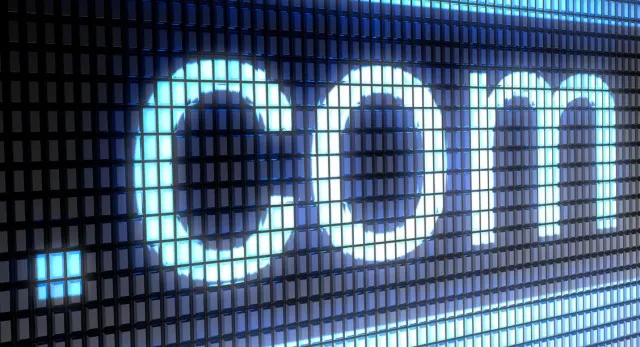The “.com” domain is something we encounter daily when browsing the internet, yet very few of us stop to think about what it actually means. Whether you’re shopping online, reading a blog, or doing a Google search, chances are that many of the websites you visit end with “.com.” So, what exactly does “.com” stand for, and why has it become the most widely recognized domain extension? Let’s explore the history and significance behind the iconic “.com” domain.
The Origins of the “.com” Domain

Believe it or not, the internet as we know it today started with a handful of domain extensions. On January 1, 1985, the first set of internet domains was introduced, including “.edu” for educational institutions, “.gov” for government websites, and “.org” for non-profit organizations. Among these, the “.com” domain was specifically created for commercial entities.
But what does “.com” really mean?
The term “.com” is short for “commercial,” and its original purpose was to serve businesses and corporations looking to establish an online presence. In the early days of the internet, this made perfect sense, as the web was seen primarily as a platform for business-to-business communication, not for personal blogs or social media.
As the internet grew in popularity, businesses quickly adopted the “.com” domain to build their digital footprint. Over time, this domain extension became synonymous with professionalism and credibility, making it the first choice for businesses looking to reach a global audience.
The Evolution of the “.com” Domain
Interestingly, while the “.com” domain was initially reserved for commercial use, it didn’t take long for individuals, hobbyists, and non-business organizations to jump on board. As more people gained access to the internet in the late ’90s and early 2000s, the idea of limiting “.com” to commercial entities became obsolete.
Today, anyone can register a “.com” domain, whether they are a multinational corporation or just a person starting a blog. This flexibility has contributed to the widespread use of “.com,” making it the most common domain extension in the world.
Why is “.com” So Popular?
You may wonder why “.com” is still the go-to domain extension, especially considering there are so many other options available today, such as “.net,” “.org,” and even trendy ones like “.io” and “.tech.”
Here’s why “.com” continues to dominate:
- Credibility and Trust
The “.com” extension has been around for so long that people naturally associate it with reliability. For many internet users, a website ending in “.com” feels more legitimate and trustworthy compared to newer or less familiar domain extensions. - Global Recognition
No matter where you are in the world, people know and trust “.com” domains. This global recognition makes it an attractive option for businesses looking to build an international presence. - SEO and Marketing Benefits
When it comes to SEO (Search Engine Optimization), “.com” domains often perform better because they are widely recognized by search engines and users alike. Additionally, a “.com” domain is easier to remember, making it a valuable marketing tool. - Availability
Although many “.com” domain names are already taken due to its popularity, new businesses and individuals still prefer to get creative and find a suitable “.com” option because of its longstanding reputation.
How Does “.com” Compare to Other Domain Extensions?

There are plenty of other domain extensions out there, but how do they stack up against “.com”?
- “.edu”: Reserved for educational institutions, mainly universities and colleges. This extension helps to immediately identify a website as a trusted academic source.
- “.gov”: Used exclusively by government agencies, ensuring that any website with this domain is official and legitimate.
- “.org”: Traditionally associated with non-profit organizations, “.org” is still widely used by charities, open-source projects, and communities. Unlike “.com,” which implies commercial intent, “.org” often signals that a website is more focused on serving a cause rather than making a profit.
- “.net”: Originally intended for network-related organizations, but now used more widely. While “.net” is still a solid choice, it doesn’t carry the same prestige as “.com.”
- “.io” and other trendy extensions: In recent years, extensions like “.io” have gained popularity, especially among tech startups and gaming companies. These extensions may be trendy, but they don’t offer the same level of trust and recognition that “.com” does.
Why “.com” is Still the Best Choice for Businesses
Despite the rise of alternative domain extensions, “.com” remains the gold standard for businesses and individuals alike. If you’re a business owner or planning to create a website, securing a “.com” domain should be your top priority. Here’s why:

- Professionalism: A “.com” domain instantly conveys professionalism and legitimacy. It’s the domain extension people expect to see when they’re visiting a business website.
- User Expectations: Many internet users automatically assume that a website will end in “.com.” If your website uses a different extension, you risk losing traffic to other sites with the same name but a “.com” domain.
- Branding Power: A “.com” domain strengthens your brand by giving it global recognition. No matter the industry, a “.com” address helps establish your online presence.
The Future of the “.com” Domain
With the explosion of domain extensions in recent years, one might wonder if “.com” will eventually be replaced by newer options. While trends come and go, it’s clear that “.com” is here to stay.

Its deep-rooted association with credibility and trust means that businesses will likely continue to prefer it for years to come. Even as the internet evolves, “.com” remains a symbol of authority and stability in the digital world.
Conclusion: Why “.com” Stands the Test of Time
In the vast world of the internet, “.com” has stood the test of time as the most recognized and widely used domain extension. Originally created for commercial use, it has evolved into a versatile domain that is used by businesses, individuals, and organizations alike. Its widespread popularity and association with trust and professionalism make it the best choice for anyone looking to build an online presence.
As you consider your domain options, keep in mind that while there are many choices available today, none offer the universal recognition and credibility of “.com.” Whether you’re starting a new business, launching a personal blog, or expanding your brand’s reach, a “.com” domain is still the best way to ensure your site is taken seriously in the online world.